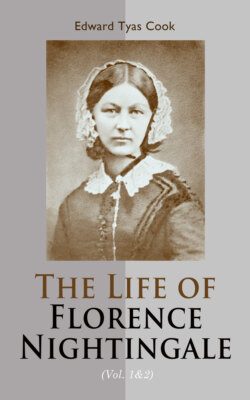Читать книгу The Life of Florence Nightingale (Vol. 1&2) - Edward Tyas Cook - Страница 22
На сайте Литреса книга снята с продажи.
CHAPTER III
THE SPIRITUAL LIFE
ОглавлениеTable of Contents
Though the outward man may perish, yet the inward man is renewed day by day. For our light affliction, which is but for a moment, worketh for us a far more exceeding and eternal weight of glory; while we look not at the things which are seen, but at the things which are not seen: for the things which are seen are temporal, but the things which are not seen are eternal.—St. Paul.
The failure of her plan left Florence in a state of great dejection. “The day of personal hopes and fears,” she wrote, “is over for me. Now I dread and desire no more.” This was but a passing mood; and very soon, as we shall hear in the next chapter, she resumed, with increased determination, her struggle for freedom and self-expression in a life of action. But for the moment, and at many recurring moments in later years, the dejection was intense. It was not merely the disappointment of an eager mind denied its appropriate energy; it was the exceeding bitter cry of an intensely religious soul, tempted in its perplexity to ask, “My God, my God, why hast Thou forsaken me?”
In some autobiographical notes Miss Nightingale recorded under the year 1843 “an illness and an acquaintance I made with a woman to whom all unseen things seemed real, and eternal things near, awakened me” [from dreaming]. The woman to whom she referred was, it may safely be conjectured, Miss Hannah Nicholson. They met once or twice a year—when Miss Nicholson visited Embley or Miss Nightingale stayed with Miss Nicholson's brother at Waverley. At other times they exchanged a voluminous correspondence, and this was almost entirely devoted to religious experiences and speculations. “Aunt Hannah” had inexhaustible sympathy with her self-torturing young friend. She did not chide or discourage Florence; but the burden of her message was the claim of the spiritual life, the message of Paul to the Corinthians. “Your whole life,” wrote Florence in one of many bursts of affectionate gratitude to Miss Nicholson, “seems to be love, and you always find words in your heart which, without the pretension of enlightening, yet are like a clearing up to me. You always seem to rest on the heart of the divine Teacher, and to participate in His mysteries.” “Your letters,” she said on another occasion, “stay by me and warm me when the dreams of life come one after another, clouding and covering the realities of the unseen.” To this sympathetic and (in some limited respects) kindred soul, Florence poured out unreservedly the experiences of her spiritual life; as also, sometimes, though with more conscious art of literary expression, to Miss Clarke in Paris.
